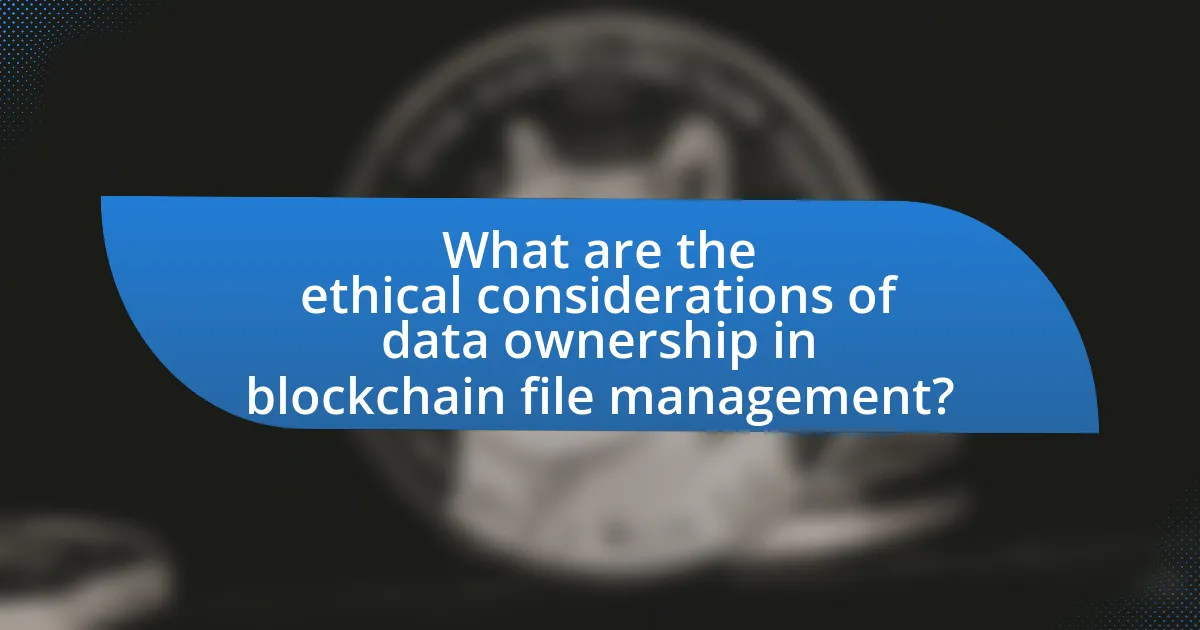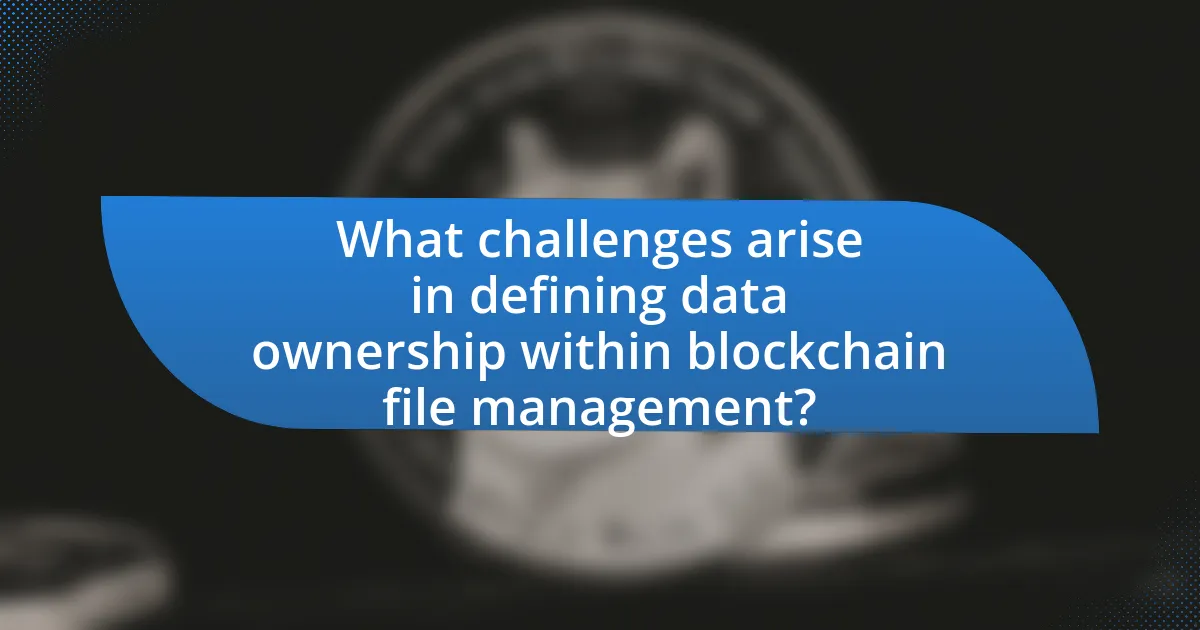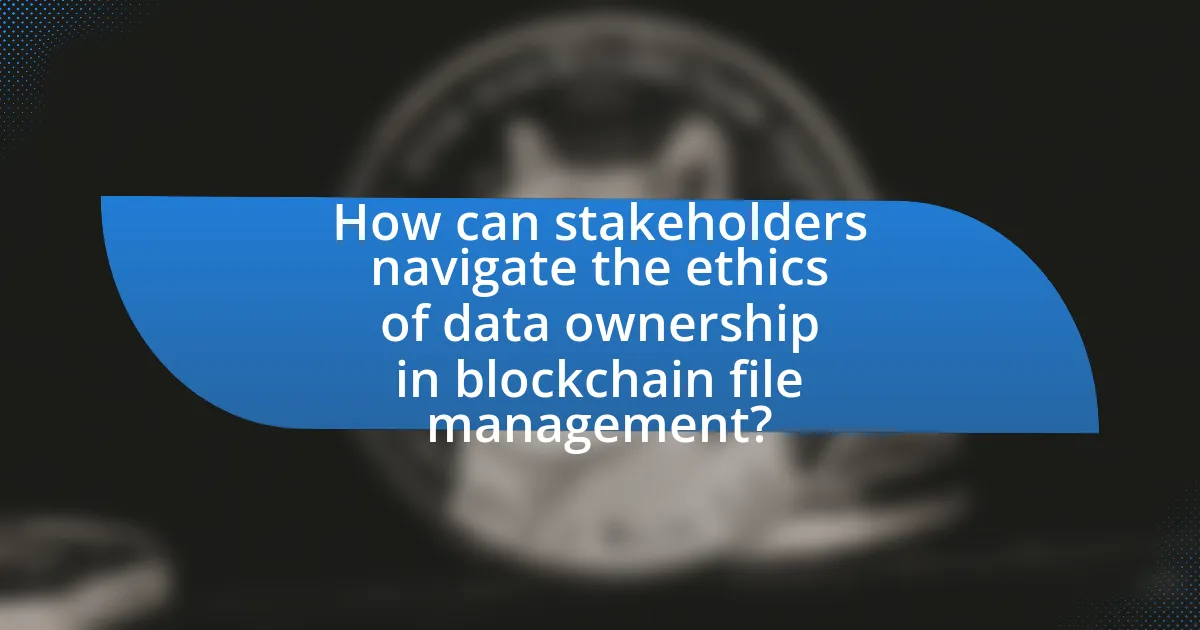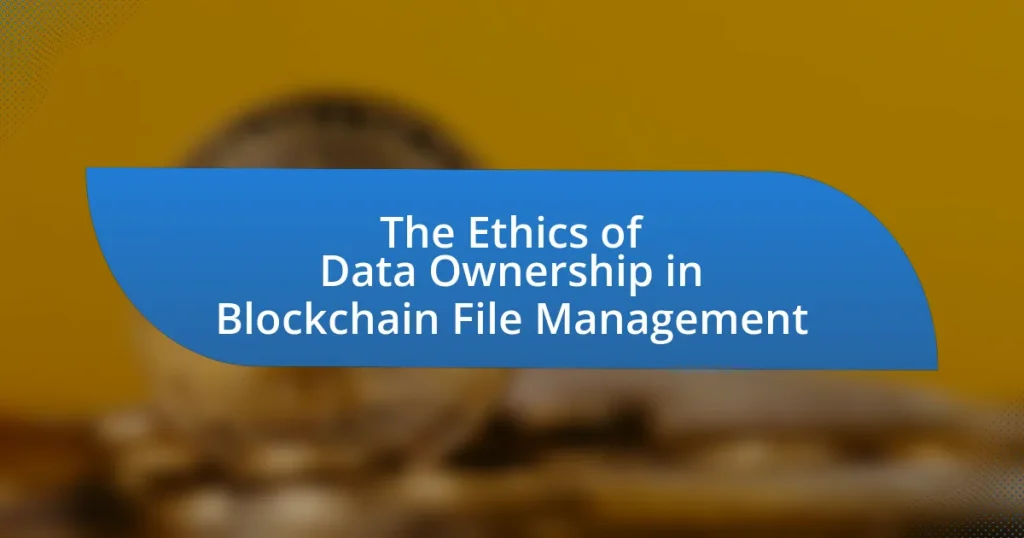The article examines the ethical considerations surrounding data ownership in blockchain file management, focusing on issues such as consent, privacy, and accountability. It highlights how blockchain technology alters traditional data ownership ethics by promoting decentralization, transparency, and user control. Key principles of data ownership, including immutability and user autonomy, are discussed alongside the challenges of defining ownership rights within decentralized systems. The article also explores the role of legal frameworks, smart contracts, and emerging regulations in shaping data ownership ethics, emphasizing the importance of clear governance and best practices for organizations and individuals to navigate these complexities.

What are the ethical considerations of data ownership in blockchain file management?
The ethical considerations of data ownership in blockchain file management include issues of consent, privacy, and accountability. In blockchain systems, data is often immutable and transparent, which raises questions about who truly owns the data and how it can be used. For instance, individuals may not fully understand the implications of their data being stored on a public ledger, leading to potential violations of privacy rights. Furthermore, the decentralized nature of blockchain complicates accountability, as it can be unclear who is responsible for data misuse or breaches. These considerations highlight the need for clear policies and frameworks to ensure ethical data ownership practices in blockchain environments.
How does blockchain technology influence data ownership ethics?
Blockchain technology fundamentally alters data ownership ethics by enabling decentralized control and transparency over data assets. This decentralization empowers individuals to retain ownership of their data, as blockchain allows for secure, immutable records of transactions and ownership without reliance on centralized authorities. For instance, in traditional systems, data ownership often resides with corporations, leading to ethical concerns regarding privacy and consent. In contrast, blockchain’s distributed ledger technology ensures that users can manage their own data, granting them greater autonomy and control. This shift is supported by the increasing adoption of decentralized applications (dApps) that prioritize user rights, as evidenced by projects like Ethereum, which facilitate peer-to-peer interactions while maintaining ethical standards in data ownership.
What are the fundamental principles of data ownership in blockchain?
The fundamental principles of data ownership in blockchain include decentralization, immutability, transparency, and user control. Decentralization ensures that no single entity has complete control over the data, distributing authority across a network of participants. Immutability guarantees that once data is recorded on the blockchain, it cannot be altered or deleted, providing a permanent record of ownership. Transparency allows all participants to verify transactions and ownership without needing a trusted intermediary, fostering trust among users. User control empowers individuals to manage their own data, deciding who can access it and under what conditions, aligning with the principles of privacy and consent. These principles collectively enhance the ethical management of data ownership in blockchain environments.
How does decentralization affect ethical data ownership?
Decentralization enhances ethical data ownership by distributing control among users rather than central authorities. This shift allows individuals to maintain greater autonomy over their personal data, reducing the risk of exploitation by corporations or governments. For instance, blockchain technology enables users to own and manage their data through cryptographic keys, ensuring that they have the exclusive right to access and share their information. Research indicates that decentralized systems can lead to increased transparency and accountability, as seen in projects like IPFS (InterPlanetary File System), which promotes user ownership and control over data storage.
Why is data ownership important in the context of blockchain?
Data ownership is crucial in the context of blockchain because it ensures that individuals maintain control over their personal information and digital assets. This control is fundamental to the decentralized nature of blockchain, which empowers users to manage their data without reliance on intermediaries. Furthermore, data ownership on blockchain enhances privacy and security, as users can dictate who accesses their information and under what conditions. The immutability of blockchain records also guarantees that ownership claims are verifiable and tamper-proof, reinforcing trust in digital transactions.
What risks are associated with unclear data ownership?
Unclear data ownership poses significant risks, including legal liability, data misuse, and compromised data integrity. When ownership is ambiguous, organizations may face challenges in enforcing data protection regulations, leading to potential legal repercussions. For instance, the General Data Protection Regulation (GDPR) mandates clear data ownership to ensure accountability; failure to comply can result in fines up to 4% of annual global turnover. Additionally, unclear ownership can lead to unauthorized access and misuse of sensitive information, increasing the risk of data breaches. Furthermore, ambiguity in ownership can compromise data integrity, as it becomes difficult to ascertain who is responsible for maintaining and securing the data, potentially resulting in inaccurate or corrupted data.
How does data ownership impact user trust in blockchain systems?
Data ownership significantly enhances user trust in blockchain systems by ensuring that individuals have control over their personal information. When users know they own their data, they feel more secure and confident in the integrity of the system, as blockchain technology provides transparency and immutability. Research indicates that 81% of consumers are concerned about their data privacy, and ownership alleviates these concerns by allowing users to manage access and permissions. This empowerment fosters a sense of accountability and reliability in blockchain applications, ultimately leading to increased user engagement and trust.

What challenges arise in defining data ownership within blockchain file management?
Defining data ownership within blockchain file management presents challenges such as the immutability of data, the decentralized nature of blockchain, and the lack of clear legal frameworks. The immutability of blockchain means that once data is recorded, it cannot be altered, complicating the assignment of ownership when errors or disputes arise. Additionally, the decentralized nature of blockchain distributes control across multiple nodes, making it difficult to identify a single owner or authority responsible for the data. Furthermore, existing legal frameworks often do not adequately address the unique characteristics of blockchain technology, leading to ambiguity in ownership rights and responsibilities. These factors collectively hinder the establishment of clear and enforceable data ownership in blockchain environments.
How do legal frameworks address data ownership in blockchain?
Legal frameworks address data ownership in blockchain by establishing guidelines that define the rights and responsibilities of data owners, users, and service providers. For instance, regulations such as the General Data Protection Regulation (GDPR) in the European Union assert that individuals have rights over their personal data, including the right to access, rectify, and erase data, even when stored on a blockchain. Additionally, legal interpretations of property rights in various jurisdictions are evolving to recognize digital assets, which can include data stored on blockchain, as property that can be owned and transferred. This recognition is crucial for resolving disputes over data ownership and ensuring compliance with existing laws.
What are the limitations of current laws regarding blockchain data ownership?
Current laws regarding blockchain data ownership are limited by their inability to clearly define ownership rights in decentralized systems. Traditional legal frameworks often rely on centralized entities for data control, which conflicts with the decentralized nature of blockchain technology. For instance, existing intellectual property laws do not adequately address the unique characteristics of blockchain, such as immutability and pseudonymity, leading to ambiguity in ownership claims. Additionally, jurisdictional challenges arise because blockchain operates globally, yet laws are typically enforced locally, complicating legal recourse for ownership disputes. These limitations hinder the establishment of clear legal standards for data ownership in blockchain environments.
How do different jurisdictions approach data ownership in blockchain?
Different jurisdictions approach data ownership in blockchain through varying legal frameworks and regulatory interpretations. For instance, the European Union emphasizes data protection under the General Data Protection Regulation (GDPR), which grants individuals rights over their personal data, impacting how blockchain data ownership is perceived. In contrast, the United States lacks a comprehensive federal data ownership law, leading to a more fragmented approach where states like California have enacted their own regulations, such as the California Consumer Privacy Act (CCPA), which also addresses data rights but with different stipulations. Additionally, countries like China have adopted a more centralized approach, where the state retains significant control over data, influencing ownership dynamics on blockchain platforms. These differences highlight the complexity of data ownership in blockchain across jurisdictions, shaped by local laws and cultural attitudes towards privacy and data rights.
What role do smart contracts play in data ownership?
Smart contracts facilitate data ownership by automating and enforcing agreements regarding data access and usage on blockchain networks. They enable users to define specific conditions under which data can be accessed or transferred, ensuring that ownership rights are respected and maintained without the need for intermediaries. For instance, a smart contract can stipulate that only authorized parties can access certain data, and it can automatically execute actions, such as transferring ownership or granting permissions, when those conditions are met. This automation reduces the risk of unauthorized access and enhances transparency in data transactions, as all actions are recorded on the blockchain, providing an immutable audit trail.
How can smart contracts enforce data ownership rights?
Smart contracts can enforce data ownership rights by automating the execution of agreements based on predefined conditions encoded within the contract. These self-executing contracts operate on blockchain technology, ensuring that ownership rights are transparently recorded and immutable. For instance, when a user uploads data to a blockchain, a smart contract can automatically grant access rights to the data owner while restricting others from unauthorized use. This mechanism is supported by the inherent properties of blockchain, such as decentralization and cryptographic security, which prevent tampering and ensure that ownership records are verifiable.
What are the potential pitfalls of using smart contracts for data ownership?
The potential pitfalls of using smart contracts for data ownership include issues related to immutability, lack of legal recognition, and security vulnerabilities. Immutability means that once a smart contract is deployed, it cannot be altered, which can lead to problems if errors are discovered or if the data ownership needs to change. Additionally, many jurisdictions do not legally recognize smart contracts, which can complicate enforcement and dispute resolution. Security vulnerabilities, such as coding errors or exploits, can lead to unauthorized access or loss of data, as evidenced by incidents like the DAO hack in 2016, where vulnerabilities in smart contracts resulted in the loss of millions of dollars. These factors highlight the complexities and risks associated with relying on smart contracts for data ownership.

How can stakeholders navigate the ethics of data ownership in blockchain file management?
Stakeholders can navigate the ethics of data ownership in blockchain file management by establishing clear governance frameworks that define ownership rights and responsibilities. These frameworks should include transparent policies that outline how data is collected, stored, and shared, ensuring that all parties understand their rights and obligations. For instance, the General Data Protection Regulation (GDPR) in Europe mandates that individuals have rights over their personal data, which can serve as a model for ethical data ownership practices in blockchain environments. Additionally, stakeholders should engage in ongoing dialogue with users to address concerns and adapt to evolving ethical standards, thereby fostering trust and accountability in data management.
What best practices should organizations follow regarding data ownership?
Organizations should establish clear data ownership policies that define who is responsible for data management and access. This includes assigning specific roles to individuals or teams for data stewardship, ensuring accountability and transparency in data handling. Additionally, organizations should implement robust data governance frameworks that outline data usage, compliance with regulations, and security measures. For instance, the General Data Protection Regulation (GDPR) mandates that organizations must clearly identify data controllers and processors, reinforcing the importance of defined ownership. Regular audits and training on data ownership responsibilities further enhance adherence to these practices, ensuring that all stakeholders understand their roles in protecting and managing data effectively.
How can organizations ensure transparency in data ownership?
Organizations can ensure transparency in data ownership by implementing clear data governance policies that define ownership rights and responsibilities. These policies should include detailed documentation of data sources, usage, and access controls, which can be made accessible to all stakeholders. Additionally, utilizing blockchain technology can enhance transparency by providing an immutable record of data transactions, allowing stakeholders to verify ownership and changes in real-time. Research indicates that organizations employing blockchain for data management experience increased trust and accountability, as evidenced by a study published in the Journal of Business Research, which highlights the effectiveness of blockchain in enhancing data integrity and ownership clarity.
What strategies can be implemented to protect user data rights?
To protect user data rights, organizations can implement strategies such as data encryption, user consent protocols, and transparent data usage policies. Data encryption ensures that user information is securely stored and transmitted, making it inaccessible to unauthorized parties. User consent protocols require explicit permission from individuals before collecting or processing their data, thereby empowering users with control over their personal information. Transparent data usage policies inform users about how their data will be used, shared, and stored, fostering trust and accountability. These strategies align with regulations like the General Data Protection Regulation (GDPR), which emphasizes the importance of user rights in data management.
What future trends may influence data ownership ethics in blockchain?
Future trends that may influence data ownership ethics in blockchain include the rise of decentralized identity solutions, increased regulatory scrutiny, and advancements in privacy-preserving technologies. Decentralized identity solutions empower individuals to control their personal data, shifting the ethical landscape towards user-centric ownership. Increased regulatory scrutiny, as seen with the General Data Protection Regulation (GDPR) in Europe, mandates clearer data ownership rights, compelling blockchain projects to adapt their frameworks accordingly. Additionally, advancements in privacy-preserving technologies, such as zero-knowledge proofs, enhance data security while allowing for ethical data sharing, thus reshaping the conversation around ownership and consent in blockchain environments.
How might advancements in technology reshape data ownership concepts?
Advancements in technology, particularly in blockchain and decentralized systems, may fundamentally reshape data ownership concepts by enabling individuals to retain control over their personal data. Blockchain technology allows for secure, transparent, and immutable records of data transactions, which empowers users to manage their own data without reliance on centralized authorities. For instance, the implementation of smart contracts can automate data sharing agreements, ensuring that users maintain ownership rights while benefiting from data monetization. This shift is supported by the increasing demand for privacy and data protection, as evidenced by regulations like the General Data Protection Regulation (GDPR) in Europe, which emphasizes user consent and control over personal information.
What emerging regulations could impact data ownership in blockchain?
Emerging regulations that could impact data ownership in blockchain include the General Data Protection Regulation (GDPR) in Europe and the California Consumer Privacy Act (CCPA) in the United States. GDPR mandates that individuals have rights over their personal data, which can conflict with the immutable nature of blockchain technology, potentially requiring modifications to how data is stored and accessed. CCPA enhances consumer rights regarding personal data, influencing how blockchain applications manage user consent and data sharing. These regulations necessitate compliance strategies that address the tension between decentralized data ownership and regulatory frameworks aimed at protecting individual privacy rights.
What practical steps can individuals take to understand their data ownership rights in blockchain?
Individuals can take several practical steps to understand their data ownership rights in blockchain. First, they should educate themselves about blockchain technology and its implications for data ownership by reading reputable sources, such as academic papers and industry reports. For instance, the “Blockchain and Data Ownership” report by the World Economic Forum outlines how blockchain affects data rights. Second, individuals can review the terms of service and privacy policies of blockchain platforms they use, as these documents often detail data ownership rights. Third, engaging with community forums and attending workshops can provide insights from experts and peers about data ownership issues. Lastly, consulting legal professionals who specialize in blockchain can help clarify specific rights and obligations under applicable laws, such as the General Data Protection Regulation (GDPR) in Europe, which addresses data ownership and privacy.


